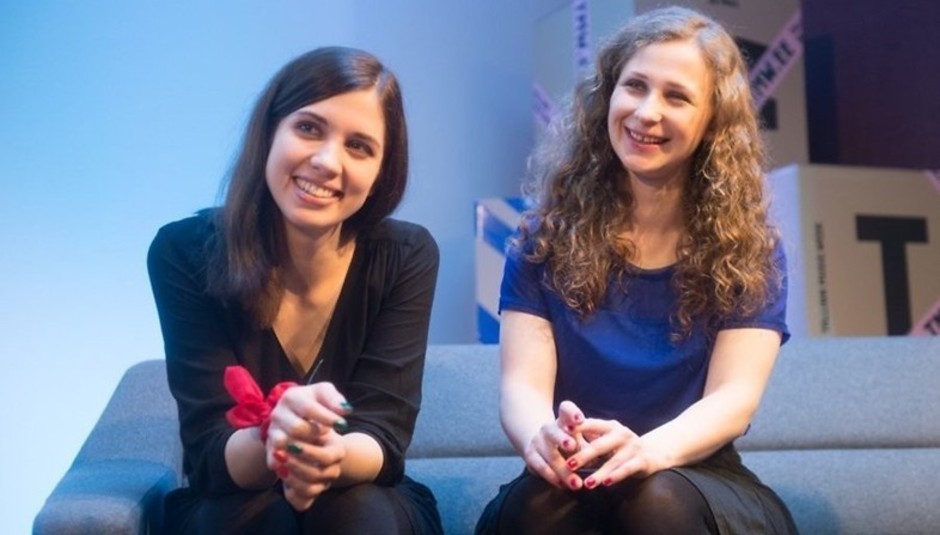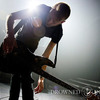Music journalists tend to move in packs. They swarm between scenes, not hunting so much as lurking, flocking here and there with low opinions and raised eyebrows. Music journalists lurk on the fringes of The Event, leaning in backwardmost rows, trying to detach or levitate themselves somehow, to maybe dart through the underbrush and seize an elusive lede. But just as well as they lurk, music journalists scatter. They seek their own narrative, anxious to please. Obsequious, almost.
Music journalists are unsure what to do with their hands, which is why they buy notepads.
Friday A.M.
And so it is here in Tallinn, at a waiters-with-trays press conference, that your Drowned in Sound correspondent lurks alone holding his biro and a champagne glass, willing anybody else to submit a killer question to Pussy Riot’s most famous members, Nadezhda Tolokonnikova and Maria Alyokhina.
Since arriving yesterday, we journalists have dutifully studied the ex-Soviet surrounds. We have spied era-spanning castles and Baltic forts, wide fading roads bisected by menacing trams. We've meandered into the old town: spotted a ruddy woman with drooping tulips in small pots who publicises her wares to a passing couple, disinterested. Soon appeared the regulars, barking buskers, yakking youths, ogling OAPs. Eastern Europeans whose smiles have that warmth and shining aliveness that’s the exclusive preserve of eastern Europeans...
The press conference goes on and into its sixty-eighth minute. Sixty-eight minutes and Pussy Riot are yet to offer headline- (or even subhead-) worthy copy. Who among us will step up?
Evidently Estonia has pulled out the stops to establish Tallinn as a post-Soviet culture hub. This festival has sophisticated restaurants, champagne conferences and an opening speech from president Toomas Hendrik Ilves, a cultured postpunk who attended CBGBs while studying at Columbia University. The festival’s subsequent heft is reflected in diverse attendance: bands, bookers, promoters, publicists, journalists, managers, festival curators and assistants. Their trail runs not just Balticwide but right across Scandanavia and down into southeastern Europe, not to mention the healthy British contingent, and here and now in the conference room there frown or ogle or lurk a substantial majority, eyeing these two world-famous women, stern but unruffled after last month’s brutal McDonalds attack, who are being interviewed, for now, by Soviet rock critic Artemy Troitsky.
We’re aware our music isn’t highbrow, but that wasn’t our aim. It’s conceptual: we’ve always been fans of a bad rhyme, bad music and bad words.
It’s easy to be cynical, but for many, Pussy Riot’s international groundswell is on a par with, say, the election of Barack Obama: a universal moment with socio-spiritual qualities that illuminate something redemptive in the collective human spirit. (It’s revealing that, on first seeing the pair in person, it’s all you can do not to well up and bawl.) No surprise to say their passage wasn’t easy: the president, a long-standing Pussy Riot advocate, fought opposition from prominent Russian-Estonians to ensure their billing, which of course is a huge boon to the festival. And yet until they speak up on the group's collective future or its attack strategies or of course that small tricky situation in the Crimea, you might argue it’s not much of anything at all.
This idea was simple: everybody has to have access to our music, and anybody can be Pussy Riot. It has to be available to everyone. If people cannot make music, at least they can listen to us.
The conference takes place in official delegate hub Nordic Hotel, its lobby a profusion of blazers and trenchcoats that’s more than anything like a school play’s idea of a business conference. The buzz is warranted: President Ilves, whose two security guards are huge in every direction, delivers a brilliant speech citing Arvo Pärt - the local composer banished for Soviet skepticism - and the historic Singing Revolution as Pussy Riot’s predecessors in the Estonian spirit of anti-collectivism. (We’ll bypass the tiny snag that, given Tolokonnikova’s alignment with righteous neo-Marxist Slavoj Žižek, you suspect eradicating collectivism is pretty low on her to-do list.)
During the first three days in Sochi, we were constantly stopped by the police, so we talked to them. The police were very unhappy about the construction and the games in the city. For the last four years, their private life was very disrupted. When we left, the police immediately started taking selfies with us.
Loud and charismatic, Troistky is an impressive presence but perhaps a flawed interviewer, his questions (eg, ‘Why make punk and not hip-hop?’) failing to exploit potential contradictions and even undermining his righteous soundbites: “Marina Abramović may be more important to art history, but I think Pussy Riot will be more valuable to world history”. After an hour the international press gets its own panel, and it’s just as I’m inspired to bite the bullet (or at least to claim I was just inspired to) that a leather-jacketed NME and sometime DiS reporter takes the initiative: “Do you support economic sanctions against Putin? Have they gone far enough, or is violence the only language he understands?”
Tolokonnikova responds quickly: “The problem with Putin is that it’s impossible to talk to him, because he doesn’t understand when he is talked to. We do not invite anyone to use weapons against weapons. Our idea is that Europe should use economic sanctions against him. No matter how much he talks about the Motherland, the only thing he and his team are interested in is money. If you stop him making illegal money, maybe he will think about his actions.”
“Tomorrow we are going to Kiev in order to support Ukraine,” Alyokhina adds. “And we are going to talk about it in the European parliament - about sanctions against Russia and Putin which will negatively influence our lives. Prices are going to go up. So Russians need to take to the streets; they’ve gotten too comfortable on the couch at home.”
Concludes Tolokonnikova, “There is a mood of apathy and pessimism which dominates Russia’s liberal circles. But saying that, I want people to know that what we do is not anti-Russian but pro-Russian. In Estonia you have legal chances to partake in politics, but in Russia, the only way to do politics is through artistic creativity. Protest is creative.”
Friday P.M.
With pull quotes gathered, it’s worth remembering that TMW is after all a music showcase, and Tallinn is very much dressed to impress (or, occasionally, to oppress). At the first venue, a complexly abbatoirlike warehouse, black mould peppers the stone ceiling and giant structures protrude like Star Destroyers in disrepair. This is Kultuurikatel, a setting I’m told backdropped Tarkovski’s 1979 film Stalker. Its future as a spectacular music venue is bright, fully government-endorsed, but there’s no telling some people: “In Finland”, one cheery punter confides, “we have seen this before. Venues like this become corporate offices. This doesn’t stand a chance”.
It should be noted that international press often receive free or discounted booze, and after Blood Pavillion (a sort of flatpack noosewave that sounds like Satan trudging through snow), the lurking pack of journalists loosens somewhat, exhibiting rare scenes of en masse engagement with their habitat. Following handshakes with interesting Europeans, our focus returns to MIMproject, who for all their bowel- and head-fucking music (think rapid steelworks reversed in slo-mo) have nothing on the band coming up.
Estonian duo Faun Racket use gentler but no less grisly means of disembowlment. Think late-era Bowie meets late-era Scott Walker, delivered by mid-era Gary Numan; mid-length hair, mid-rent gear, synth-warriors suited and shirted. An element in the music is terribly dark yet beaming somehow, plastically iridescent. Rhythms slip off the ledge. The set ends in cosmic disarray. Minutes later, mainman Andrea Lõo swaggers confidently upstairs looking like arthouse cinema incarnate, before, as our eyes meet, suddenly seeming to want nothing less than an interview with your correspondent, infrared-flashing dictaphone in hand, who bears nonetheless down the rickety staircase...
I suppose I feel that, this year, the delegates and visitors think it’s really worthwhile. I’ve been performing here almost every year with a different act. I don’t have much patience; I go through phases and hope to get a reputation abroad. And we have the best slot tonight, so I’m humbled. In a way, we [in Tallinn] are on the edge of the world - definitely the edge of the EU - so it’s a nice destination for people looking for edgier electronic music. - Andrea Lõo
The night scurries on. A friendly publicist eager to network with writers shepherds your distractible correspondent, by now markedly worse for wear, to a vast backstage area littered with buzzy vibes and joshing goths and lank-haired bassists, all who now very quickly shut up and stare back at your somewhat besmirched and bedraggled and perhaps this moment even wild or somehow feral-looking correspondent, and in a pinhead turn that proves embarrassment life’s fastest motivator I summon some vestige of dignity to blubber my excuses and scuttle back to the scattered journalistic tribe, one member of which is muttering confused obscenities at a good-natured Baltic fellow while another takes artful PhD-grade shots of the complex Tarkovskian interior. It’s a pretty good night. After admiring Holy Motors (see above) I wander back to the hotel, tail between legs, looking onward to the casual (if strictly timekept) brunch the following morning, which we’re reminded is super-important.
Saturday
As I wake up blinding sun roars through the hotel curtains; this is because it’s 3pm. It is by extension several hours past brunchtime, and this misfortune is a perfect excuse to explore TMW’s ‘Eats’ subfest, several citywide restaurants offering cutprice ‘Eats’ (meaning, ‘Things You Can Eat’) aimed at that annual clientele who possess benefactors and company cards. While the food is reliably magnificent, special mention goes to Salt, an eatery just out the centre which fills a neat hour before we cab cheaply towards DiS’s band of the festival.
Dad Rocks!, those elfishly charismatic Danes, are today a quartet comprising two violinists, their deadpan frontdude and one handsome double-denim backup who mostly sort of lurks beside his laptop, ogling impishly. “This is a song,” says singer Snævar Njáll Albertsson, who has a soul patch, “about being on tour and being away from girlfriends or boyfriends and therefore feeling a little... horny.” As you can guess, their set is an overall charming crusade against the stranglehold of cynicism and irony. Lines like “I became a boy when I received my first Happy Meal toy” get much laughter, not just because they’re funny but because the music is stirring and attendance not nearly satisfactory and, furthermore, technical issues abound, so we’re all jointly impelled to come together and create big happiness.
It spills into the night, as Saturday sees our first nonfestival interaction when the stag clientele hit the streets, yelling obscenities in so many languages. It’s in these moments that, paradoxically, you come to witness the city from a native perspective, feeling unsettled and grimly tolerant. You believed the innercity roads yours, narrow cobbled alleys threatened on both sides by four-storey terraces, Victorian-seeming but whitewashed and graffitied, the odd belltower pointing heavenward. And in a way, amid the festival sprawl, they sort of are, at least momentarily. It’s tucked within one that we establish a new base in the mystical Von Krahl Bar.
A floor below the upper level, which has a second room and a free-for-delegates bar, Von Krahl’s rafter-rammed balcony overlooks a long slender stagefront, a combination ensuring close proximity for all. A quick glance reveals surrealist art chalked on the ceiling which augurs well for buzzy new thing Vul Vulpes, an elegantly disinterested singer who you won’t believe’s quite as young as your told. Her style is twisted polyrhythmic synthpop; Grimes in ‘Oblivion’ meets Grimes in oblivion. She bobs and glances backdropped by dark technogoth visuals, wearing a tight-collared blouse interrupted at the hip by floral pyjamas that billow down and crescendo in black stiltlike heels. Her songs, frequently great, have that internet-musical tendency to seamlessly merge transcultural sounds into something amateurishly thrilling and darkly exotic. Everybody stands and stares.
When the comedown sets in, you start to appreciate little things. Take Gis Von Ice, our hardy guide, whose character is in the European tradition of rugged men with bullshit-free dialect and hardline humour. His repertoire includes, eg, poking fun at one distraught and fever-ridden journalist representing a popular music and fashion magazine, whose Sunday morning has consisted of mewling sullenly as we lurk altogether in the hotel lobby, which at some point became a sort of corpse-strewn warzone where phrases like ‘worse for wear’ and ‘absolutely battered’ circulate like rations, and meanwhile the triple-rollover dread of cheap and beery nights hangs fuglike in the air, all full up with lurking lows and latent paranoia and even simmering resentment for the by all accounts wonderful hotel staff, who really just do their best, and really you just need a pickup from a friendly local or an elusive beauty or a stern middle-aged man with a long moustache and short shrift for your problems. The point being, at a time when reserves run low and all else fails, it’s the good old European spirit that will heave you up winch-like, out and into sanctuary.






















